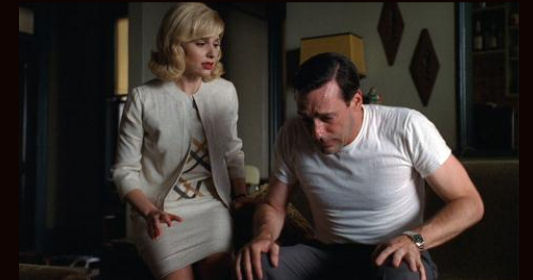And that's what happened this year.
In this episode titled "Tomorrowland," Weiner and company had Don finally choose between being Don or Dick, and he chose Don but without rejecting all of Dick, perhaps owning more than just a nickname.
Should this episode have been titled "Fanstasyland" because Don's self-image includes being the "handsome prince" and, in his fantasy Megan, is "Cinderella?" Faye would have had trouble avoiding the "wicked stepmother" role with Sally. Megan will have trouble, but it will only be because she's trying too hard to be Maria Von Trapp.
One can't help but feel that Don is enchanted with Megan. She's the perfect French-speaking au pair (to use a word not commonly used for a "nanny" in 1965) for the kids. And she's smart, but at 25 not "too seasoned" and therefore not yet aggressively cynical. And she's attractive even if a bit "toothy." She thinks she knows Don, and in some ways she does know Don - she just doesn't know Dick.
But all in all, Don thinks he has found a way to replace Carla and Betty. And it is a significant improvement over the latter for the kids.
We don't really know anything about Megan who at ...what, 23 or 24?... moved from Montreal bringing her French Canadian heritage to New York City. And if we don't know anything, think how little Don knows about what "Tomorrowland" means to a 25-year-old French Canadian woman in 1965 in the United States.
What are these two going to talk about? When Megan calls home all excited about her engagement, Don wants to talk but Megan points out he doesn't speak French.
Some things are clear from this episode:
- Don/Dick has severed his formal ties with California by selling Anna's house.
- Don/Dick wants the life he thinks Don would have had and impulsively uses the ring dead Don gave dead Anna as a charm to get it.
- Sterling Cooper Draper Pryce may survive the Lucky Strike crisis, but it will require hard work particularly by Peggy and Joan.
- Peggy and Joan have bonded as the underestimated women of SCDP.
- Joan, as we suspected, did not have the abortion and is misleading her absent and fully deserving husband.
- Don/Dick is a less hung up guy in California and it remains to be seen if live Don can in any way be that guy in New York.
- I don't know why Anna gave the ring to Don/Dick but as a charm with death all over it, can it symbolize a better life?
- Will Don and toothy Megan (played by Jessica Paré, who is either very talented or takes direction very well) be a married couple in episode 1 of next season?
- What year will next season be set in, as 1966 doesn't offer much background, 1967 does offer the Montreal World's Fair, and 1968, with all of its violence and death, just seems to push the kid's ages?
In a gut wrenching scene, Betty fired Carla exerting what little power she has over the one adult she could. And she won't even write a letter of reference. (Let's hope Don will handle that.) But Carla has been a significant element of stability for the kids. Maybe that is the point for next season - no stability for the kids or maybe Don and Megan will form the perfect family ... naw, that would be too 1950's sitcom.
And poor Faye. You have to know that she's crying at least in part because at the beginning of this season we saw her, as a seasoned veteran of the office romance risks, predict Don would be remarried within a year. Yet she let Don know she was actually not married - just a ruse to avoid the problems - stepping right into the arena to become another victim of his charms. And we know he did use her.
About Peggy. This is a great character to watch. While she seems thrown by the development of the engagement between Don and Megan, her perception of getting the first new account since Lucky Strike, the $250,000 Topaz pantyhose account, as her saving the company made me smile. Yes, it will serve as a psychological boost to the few left in the company. Saving the firm? Well, maybe a little.
The Joan and Peggy moment after they learn about Don and Megan is a classic:
Joan: “Whatever can be on your mind?”Roger's reaction is also amusing. Wasn't Don giving him grief for marrying his secretary not so long ago?
Peggy: “Can you believe it!?”
Joan: “It happens all the time — they’re just all between marriages."
Joan: “Well, I learned a long time ago to not get all my satisfaction from this job.”
Peggy: “That’s bulls—!”
Unfortunate for Don, Roger, Joan and Peggy, they didn't get Ken's message: “Cynthia’s my life, my actual life."
And we all know that Don has no clue about Faye's comment: "I hope she knows you only like the beginnings of things."
So, we end the season with Don staring out the window, the perfect immature teen angst love song in the background:
Cher: They say we're young and we don't knowWhy do I find that a bit foreboding. After all, it worked out so well for Sonny and Cher, and of course for Chastity Bono.
We won't find out until we grow
Sonny: Well I don't know if all that's true
'Cause you got me, and baby I got you
On to next year....

















